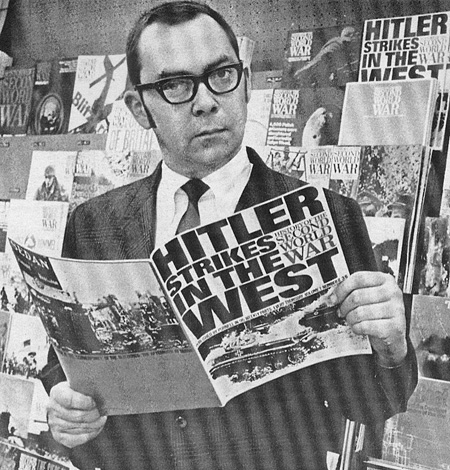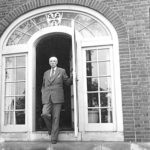Bob Carlson: Businessman, Crusader or Smut-Peddler?
By Dave Hill | Sun Magazine July 15-16, 1970
Will the real Bob Carlson please stand up and identify himself? So far, there are conflicting reports about just who the real Bob Carlson is:
An enterprising St. Paul hustler who has made an opportune bundle as a publicity-wise smut-peddler;
A crusading champion of freedom who has been victimized by the harassment of St. Paul’s self-appointed guardians of public and private morality;
A modest, even earnest small businessman who runs a group of bookstores, putting in long hours of hard work, trying to make an honest dollar just like thousands of other men in the hardware, furniture or used car lines.
When the real Bob Carlson does stand up, the situation gets a little muddled. You see, to one degree or another, all three of those confusing caricatures seem to fit him, at least a little bit.
The first description is the most obvious and Carlson doesn’t hesitate to admit that there’s some truth to it.
“Sure, I make money – that’s what I’m in business for,” he says. “And I’ve done all right. The stock market is down right now, but when it goes up again, I’ll go right up with it.” He adds that the last vacation he took, two years ago, he spent in Japan with his stock broker.
He also says that the publicity arising from the period of 1967-1968 when he was being arrested once or twice a month didn’t hurt sales either. “The stores were packed then, and the business was never better,” he admits cheerfully. “I didn’t mind the legal fees involved – it was good publicity.”
The second description is one Carlson will claim at the slightest urging. “I feel people should have the right to read anything they want to read, and I don’t believe in any kind of censorship whatsoever,” he says. “If people want to read about sex, they have the right to, and I inter to give them what they want.”
In February 1968, for example, while the legal battle raged over what was and what was not obscene in St. Paul, Carlson had a sign in his bookstore which read: “We have eight court cases pending as whether these books are obscene or not. Read them and tell us your opinion.” Below were copies of the contested books, including The Way of a Man with a Maid, Business as Usual and Adam and Eve, which were later ruled obscene by St. Paul courts.
In a U.S. Supreme Court decision handed down the last week in June [1970], Carlson had this conviction, and a second conviction – involving five books and two of his employees, reversed. “I know how hard it is to even get a Supreme Court hearing,” Carlson says, “so I think it’s very significant that they not only considered the case, but acted as they did and completely overturned the decision, citing as a reason the fact that the state had erred greatly in upholding the St. Paul court’s conviction of me.
In spite of all the arrests and a few convictions, Carlson swears he will fight “to my last dollar” to operate under the First Amendment of the Constitution which guarantees freedom of speech. “Sex is as close to us as thirst and hunger. If a person wants to read about that, I will spend my last dollar defending the right of a person to read about sex.”
Finally we have the picture of a hard-working businessman trying to make his way in the harsh world of balance sheets and profit-and-loss columns. That too fits Carlson.
Perhaps by taking a longer look at this side of Bob Carlson and seeing how he emerged on the scene as “St. Paul’s top smut-peddler” (to quote one uncharitable critic) we can get a better idea of what makes a man like this tick.
“My folks spent their whole life working in a small grocery store,” Carlson says. “We lived in the back room of the store and my father never had a vacation. He used to take three hours off on Sundays, and that was it. Just before he died, he sold the store and went to work for the man who bought it. He worked all his life and never had anything to show for it. I want more than that.”
After graduating from Mechanic Arts High School and a service stint, Carlson went to work for a wholesale house in Minneapolis, first a as a truck driver, then as a salesman. “But I wanted to be my own boss, so I took advantage of my GI loan and went in with a partner (Joe Lee, who was also a partner at one time in the book store operation, but later sold out) and bought a shredded paper company.
And it was from this shredded paper company which 30-year-old Bob Carlson ran down by the St. Paul Union Depot until 1960 that Bob Carlson, the man with all the questionable books, emerged in 1970 as the chief purveyor of titillation in the city of St. Paul.
“We got tons of magazines in with the paper to be shredded up,” he says, “and we opened up a used magazine store in the front of our factory. I started keeping track of what sold best and I found that sex sold the best, so we started selling mostly that. In those days, that was men’s magazines – Playboy and a lot that tried to be like it.”
Finally Carlson took the big jump. In 1960 he sold the factory and, with Lee, opened up the Wabasha Book Store, stocking sex, sex and more sex. But, as he explains, sex magazines then were not like sex magazines now.
“And for the next six or seven years we sold magazines and minded our own business and everything was fine. Nobody paid any attention to us and everything was perfectly all right.”
Wednesday, July 5, 1967, changed all that. On that day St. Paul police officers raided the Wabasha Book Store, arrested a clerk (Carlson wasn’t around at the moment), confiscated eight bags of material and issued a warrant for Carlson.
The great pornography war had begun.
The lines were quickly drawn, and the leading figures in what was to become one of the most interesting chapters in St. Paul moral history soon became clear.
First was Carlson, in his various roles as champion of freedom, harassed victim of oppression, hustler and out-spoken critic of St. Paul’s mores (depending on which newspaper account you happened to read).
Opposing him was Daniel Klas, assistant Corporation Counsel for St. Paul, champion of the forces of light and purity, deadly earnest in his belief that pornography was a great danger to morality and that Carlson did, in fact, sell pornography all day long – and at an outrageous price. (Some interesting courtroom scenes emerged as the economics of Carlson’s business – wholesale cost and retail prices – were discussed.)
Supporting actors were found in plenty. There was St. Paul Corporation Counsel Joseph Summers who, among other things, read passages from a book ruled pornographic by courts to the Ramsey County Bar Association, then clarified his position by saying, “We are not seeking a new millennium, preaching Moral Rearmament, or trying to change the world. I believe in the little brother doll and I do not wear long johns in the shower.” But, he added, St. Paul was going to stop the sale of hard-core pornography.
(Summers was subsequently offered a job at Notre Dame and named Young Man of the Year by the Jaycees, both at the hight of the anti-pornography crusade, though no mention of a connection between the two was ever made.)
A host of others played various roles in what soon became a running battle between Carlson, his defenders, and Klas and his supporters.
There was Public Safety Commissioner Eilliam E. Carlson who, at one point, personally visited the Wabasha Book Store and purchased a book titled Sex Life of a Cop, as the basis for one of many arrests of Bob Carlson.
There was Police Sargent Robert Kunz, who in his business of arresting Carlson’s clerk, kicked in the front door – which resulted in the charge being dropped in that arrest.
The chronicle of arrests is far too involved – and too boring, for that matter – to detail here. By the end of 1967, St. Paul police had made at least 15 arrests of book dealers in St. Paul, all but five involving Carlson.
And a few convictions resulted. The courts managed to remove three books from circulation. Carlson simply replaced them with three different titles and kept right on selling books. Any conviction was automatically appealed to the higher courts, and Carlson still has a dozen or two appeals pending at this moment.
A lot of other things happened during the pornography war. At one point Corporation Counsel Joseph Summers took a photograph of a nude woman – a picture he had used as a basis for a charge against Carlson, arguing that it was obscene – and sent it through the mails to the president of the Civil Liberties Union. (Federal law prohibits the mailing of obscene materials.)
Then there was the matter of the missing magazines. After the court had ruled the July 5, 1967, arrest invalid because police had kicked open the door and had not had a warrant, the city returned to Carlson the material confiscated.
Most of it, that is. It seemed that a number of magazines were missing. Carlson put the figure at $93 and threatened to sue the city. He alleged that Klas had taken the magazines home. Klas admitted showing them around the office, but attributed the apparent loss of the magazines to an “error in inventory.”
If 1967 was the year of arrests in the war, 1968 was the year of legal maneuvers. The ratio of arrests slackened, and most of the activity on both sides was devoted to intricate moves in the courts.
At the very end of the calendar year – December 30, 1967 – St. Paul launched a new assault on Carlson. After a dozen arrests and a paltry two convictions – $100 fines each – the city decided to try a new tack. Carlson was charged with operating a public nuisance.
After a few months of legal wrangling, this ploy failed too. The city did win a moral victory, however. It developed that Carlson’s lease on the Wabasha Book Store expired and the owner of the property – revealed to be the St. Paul YMCA – decided not to renew it.
Carlson moved across the street into larger quarters. He also opened up the enlarged version of his “Downtown Book Store” which deals in quality paperbacks and general interest magazines – no sex as such – choosing a large area in the basement of the Capri Hotel on Seventh Street.
“That’s where I like to spend my time,” Carlson says. “I get bored very quickly in the sex store. After you’ve seen that stuff, it’s all the same. But a store like this is a real challenge.”
Today he bills the Downtown Book Store as the largest and best-stocked in the state. WIth over 15,000 paperback titles, and better than 500 monthly magazine titles, he’s probably right. “If you can’t get a paperback or magazine here,” Carlson says, “you can’t get it anywhere.”
He candidly admits that he has been able to operate this store only because of the financial success of his sex store.
Carlson isn’t one to sit still, waiting for business. He looked around, decided both Duluth and Rochester needed book stores, and quickly opened branch stores there, naming them both “Wabasha Book Store,” and stocking the same mixture of sex, sex and more sex that had done him so well in St. Paul.
In addition, he opened a Downtown Book Store in Rochester, stocking quality paperbacks, and brought his total of stores to five.
It didn’t take the provinces as long to react to magazines like Teenage Nudist and paperbacks with titles such as Hot Stud for Hire as it had taken St. Paul. Hardly had Carlson opened up in 1969, than he found himself in court in both cities.
In Duluth he fared as he had in St. Paul, and still has some cases pending. Rochester was not so hospitable. There, earlier this spring, Carlson found himself sitting in the Olmstead County Jail for 29 days.
“I originally got a 90-day sentence upon conviction,” Carlson says, “with a lot of conditions. The sentence would be suspended on condition that I exhibited no magazines with a picture of a woman with her tongue hanging out. Well, we looked over the magazines, and they all seem to have pictures like that.
“So we told the court we couldn’t comply, and we went to jail, and did 27 days. I’ve still got 63 days hanging over my head down there, so I don’t know how that’s going to come out. The store is still open, and I haven’t changed my stock, but I don’t know…”
In the meantime, he had expanded operations in St. Paul. Seeing how well stag films sold, Carlson installed a battery of coin-operated movie machines in his St. Paul store and did a thriving business – for a while.
Then the police moved in and confiscated the machines this spring. “I counted eight policemen hauling out my machines,” Carlson says with a touch of bitterness. “Yet my store has been burglarized six times in the past 18 months – they come right through the front window. Never seems to be a policeman around then.”
The case of the confiscated movie machines is still in the courts, on appeal, though Carlson has paid $1,900 in fines. He has new machines ordered, but can’t get licenses to operate them. “I don’t know what I’ll do there.”
Outside of occasional newspaper headlines, Carlson leads a quiet bachelor’s life. Divorced, he points out that he spends every sunday with his two sons. “I don’t smoke, almost never drink, and I’ve gone with the same girl for three years. My idea of a wild night on the town is dinner for two and a good movie, with maybe coffee afterward.”
As far as the future, Carlson wants to open more bookstores. “Duluth could use a quality book store, and I’d like to open a quality store in the new IDS building in Minneapolis. Other than that, I’m happy doing what I’m doing – and I do intend to keep right on doing that too – selling the kinds of books that the public wants.”
***
I had to type this, so there’s probably tons of errors + autocorrect fails. Sorry for the moiré pattern – I’m lazy. |adam|
Recommended Links:
Leave a Comment
Only registered members can post a comment , Login / Register Here















28 Comments
Paul Lundgren
about 13 years agoPaul Lundgren
about 13 years agoPaul Lundgren
about 13 years agomevdev
about 13 years agomevdev
about 13 years agohbh1
about 13 years agohbh1
about 13 years agoZeito
about 13 years agosamh
about 13 years agohbh1
about 13 years agoFrench
about 13 years agoWhatever
about 13 years agohbh1
about 13 years agoWhatever
about 13 years agod
about 13 years agocarla
about 13 years agoPaul Lundgren
about 13 years agoadam
about 13 years agocarla
about 13 years agoPaul Lundgren
about 13 years agohbh1
about 13 years agoPaul Lundgren
about 13 years agozra
about 13 years agoemmadogs
about 13 years agohbh1
about 13 years agoemmadogs
about 13 years agohbh1
about 6 years agoadam
about 6 years ago